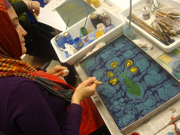January 15, 2010

Ebru Art. Download image.
BIRMINGHAM, Ala. - A new student group at the University of Alabama at Birmingham (UAB), the Cultural Diversity Club, will present a Turkish marbling demonstration by artist Mine Calik from 12:30 to 1:30 p.m. Thursday, Jan. 21 in the UAB Hill University Center Great Hall, 1400 University Blvd. The event is free and open to the public. Contact Ferhat Zengul, club president, at 205-934-2846 for details.
A unique and beautiful form of Turkish art, ebru, or water marbling, is formed by drawing designs with dye on top of water, and then carefully placing paper on the surface of the water in order to absorb the dye. The process creates a one-of-a-kind print. Modern-day students may study for more than 10 years before being considered master marblers, learning how to make the perfect dye, water bath and design. Since each dye bath can only be transferred to paper once, every piece of ebru is unique.
Marbled paper was used extensively in the binding of books and in calligraphic panels in Turkey. The earliest examples of ebru are found in the Topkapi Palace in Istanbul, dated 1539, but the detail and quality of the work suggests that ebru was present long before this time in the Ottoman Empire. Ebru rarely has been signed, therefore many great artists remain unnamed. Ancient specimens of "Turkish papers" can be seen in museums today; the papers were a colorful influence on the book arts of Europe.
About the UAB Cultural Diversity Club
The Cultural Diversity Club of UAB cherishes diversity as a valuable part of a healthy society. The purpose of the organization is to spread dialogue and friendship among UAB students and provide a platform for people from different cultures and races at UAB.